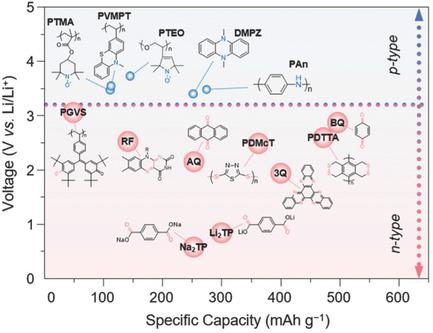当前位置:
X-MOL 学术
›
Adv. Mater.
›
论文详情
Our official English website, www.x-mol.net, welcomes your
feedback! (Note: you will need to create a separate account there.)
Recent Progress in Organic Electrodes for Li and Na Rechargeable Batteries
Advanced Materials ( IF 27.4 ) Pub Date : 2018-03-27 , DOI: 10.1002/adma.201704682 Sechan Lee 1 , Giyun Kwon 1 , Kyojin Ku 1 , Kyungho Yoon 1 , Sung-Kyun Jung 1 , Hee-Dae Lim 1 , Kisuk Kang 2
Advanced Materials ( IF 27.4 ) Pub Date : 2018-03-27 , DOI: 10.1002/adma.201704682 Sechan Lee 1 , Giyun Kwon 1 , Kyojin Ku 1 , Kyungho Yoon 1 , Sung-Kyun Jung 1 , Hee-Dae Lim 1 , Kisuk Kang 2
Affiliation

|
Organic rechargeable batteries, which use organics as electrodes, are excellent candidates for next‐generation energy storage systems because they offer design flexibility due to the rich chemistry of organics while being eco‐friendly and potentially cost efficient. However, their widespread usage is limited by intrinsic problems such as poor electronic conductivity, easy dissolution into liquid electrolytes, and low volumetric energy density. New types of organic electrode materials with various redox centers or molecular structures have been developed over the past few decades. Moreover, research aimed at enhancing electrochemical properties via chemical tuning has been at the forefront of organic rechargeable batteries research in recent years, leading to significant progress in their performance. Here, an overview of the current developments of organic rechargeable batteries is presented, with a brief history of research in this field. Various strategies for improving organic electrode materials are discussed with respect to tuning intrinsic properties of organics using molecular modification and optimizing their properties at the electrode level. A comprehensive understanding of the progress in organic electrode materials is provided along with the fundamental science governing their performance in rechargeable batteries thus a guide is presented to the optimal design strategies to improve the electrochemical performance for next‐generation battery systems.
中文翻译:

锂和钠可充电电池有机电极的最新进展
使用有机物作为电极的有机可充电电池是下一代能量存储系统的极佳候选者,因为它们由于有机物的丰富化学成分而具有设计灵活性,同时具有生态友好性和潜在的成本效益。然而,它们的广泛使用受到固有问题的限制,例如电子导电性差,易溶于液体电解质中以及体积能量密度低。在过去的几十年中,已经开发出具有各种氧化还原中心或分子结构的新型有机电极材料。此外,近年来,旨在通过化学调节来增强电化学性能的研究一直是有机可再充电电池研究的前沿,从而导致其性能取得了重大进展。这里,概述了有机可充电电池的最新发展,并简要介绍了该领域的研究历史。关于使用分子修饰来调节有机物的固有性质并在电极水平上优化其性质,讨论了用于改进有机电极材料的各种策略。提供了对有机电极材料进展的全面理解,以及控制其在可充电电池中的性能的基础科学,因此提供了有关优化设计策略的指南,以改善下一代电池系统的电化学性能。关于使用分子修饰来调节有机物的固有性质并在电极水平上优化其性质,讨论了用于改进有机电极材料的各种策略。提供了对有机电极材料进展的全面理解,以及控制其在可充电电池中的性能的基础科学,因此提供了有关优化设计策略的指南,以改善下一代电池系统的电化学性能。关于使用分子修饰来调节有机物的固有性质并在电极水平上优化其性质,讨论了用于改进有机电极材料的各种策略。提供了对有机电极材料进展的全面理解,以及控制其在可充电电池中的性能的基础科学,因此提供了有关优化设计策略的指南,以改善下一代电池系统的电化学性能。
更新日期:2018-03-27
中文翻译:

锂和钠可充电电池有机电极的最新进展
使用有机物作为电极的有机可充电电池是下一代能量存储系统的极佳候选者,因为它们由于有机物的丰富化学成分而具有设计灵活性,同时具有生态友好性和潜在的成本效益。然而,它们的广泛使用受到固有问题的限制,例如电子导电性差,易溶于液体电解质中以及体积能量密度低。在过去的几十年中,已经开发出具有各种氧化还原中心或分子结构的新型有机电极材料。此外,近年来,旨在通过化学调节来增强电化学性能的研究一直是有机可再充电电池研究的前沿,从而导致其性能取得了重大进展。这里,概述了有机可充电电池的最新发展,并简要介绍了该领域的研究历史。关于使用分子修饰来调节有机物的固有性质并在电极水平上优化其性质,讨论了用于改进有机电极材料的各种策略。提供了对有机电极材料进展的全面理解,以及控制其在可充电电池中的性能的基础科学,因此提供了有关优化设计策略的指南,以改善下一代电池系统的电化学性能。关于使用分子修饰来调节有机物的固有性质并在电极水平上优化其性质,讨论了用于改进有机电极材料的各种策略。提供了对有机电极材料进展的全面理解,以及控制其在可充电电池中的性能的基础科学,因此提供了有关优化设计策略的指南,以改善下一代电池系统的电化学性能。关于使用分子修饰来调节有机物的固有性质并在电极水平上优化其性质,讨论了用于改进有机电极材料的各种策略。提供了对有机电极材料进展的全面理解,以及控制其在可充电电池中的性能的基础科学,因此提供了有关优化设计策略的指南,以改善下一代电池系统的电化学性能。











































 京公网安备 11010802027423号
京公网安备 11010802027423号